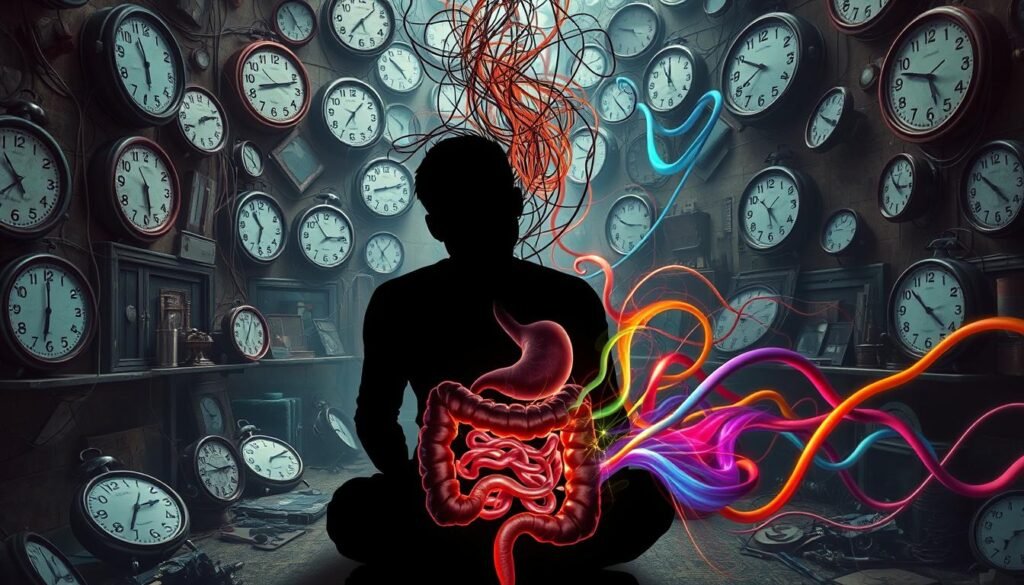Did you know over 40 million adults in the U.S. struggle with anxiety? This equals nearly 19.1% of people there. Alongside, digestive issues like constipation affect about 1 in 6 people. There’s a deep link between the mind’s health and our gut’s health. Stress messes with our digestion, so knowing how anxiety and constipation relate is key for handling stress better.
Mental health challenges, like anxiety, do more than trouble our minds. They also impact our digestion. Since the gut makes over 90% of our serotonin, its role is huge in both our mood and digestion. By focusing on how anxiety and constipation interact, we can see improvements in our overall health and life quality.
Key Takeaways
- Anxiety affects over 40 million adults in the U.S., impacting digestive health.
- Constipation affects approximately 1 in 6 people in the United States.
- Over 90% of serotonin, crucial for digestion, is produced in the gut.
- Understanding the links between mental health and gut health can improve overall wellness.
- Effective stress management can alleviate symptoms of both anxiety and constipation.
The Gut-Brain Connection: How Anxiety Influences Digestion
The gut and brain share a special link called the gut-brain connection. It forms a complex communication network known as the gut-brain axis. This link helps with important functions in mental health and digestion. When anxiety hits, hormones like cortisol increase, changing how our guts move. This can lead to issues like constipation, showing how anxiety affects our digestion.
More than 500 million neurons make up the enteric nervous system in our guts. It’s the biggest group of neurons outside the brain, showing how vital gut health is. The vagus nerve connects this system to the brain, helping to control reflexes after different triggers. This pathway is key in how the gut-brain connection affects anxiety and how we digest food.
Our gut microbiome plays a big role in this link. Microbial communities send important chemical messages between the gut and brain. Anxiety can upset our gut microbiome, leading to problems like irritable bowel syndrome (IBS). IBS can cause bloating, changes in bowel habits, and nausea. In short, anxiety changes serotonin levels in the gut, affecting our mood and digestion.
Looking into the gut-brain connection helps us understand how to manage stress-related digestive issues. Knowing that anxiety can slow digestion points us towards improving gut health. By using mindfulness, relaxation techniques, and changing our diet, we can better our mental and digestive health.
The Physiological Impact of Anxiety on Gut Health
Anxiety does more than make you feel stressed. It activates the fight-or-flight response, affecting your gut health. This response causes blood to flow away from your digestive system. As a result, digestion slows, raising the risk of constipation. The way your gut and brain talk to each other is key here.
Studies show that people with anxiety might have different gut bacteria, which can lead to dysbiosis. This imbalance can make stomach problems worse. Between 30% to 40% of people will face gut issues, often linked to their mental health. Certain gut bacteria could help protect against the constipation seen in anxious and depressed individuals.
Changing what you eat and how you act can boost your gut health. Eating probiotics and a well-rounded diet supports a healthy microbiome. This can lessen anxiety and gut issues. Research also points out that taking care of your gut can help with mental health problems and highlight the gut-brain relationship.
By learning more and staying aware, you can keep your gut healthy and feel better mentally, too. Therapies like cognitive behavioral therapy and hypnotherapy are helping. Doctors are seeing how treating the gut helps the mind. They’re using this approach more for various gut disorders.
Anxiety and Constipation: Understanding the Connection
Anxiety can lead to constipation by slowing down bowel movements. This slowdown makes things worse, creating a cycle of more anxiety and constipation.
About one-third of people with constipation also feel anxious. Similarly, about 22% have signs of depression. This shows how constipation can be linked with mental health issues.
It’s key to understand this connection to treat both issues at once. While 65% of those with constipation don’t feel depressed, a significant number do feel anxious. Knowing this helps focus treatment.
Understanding this link helps us improve mental and digestive health together. Dealing with anxiety-induced constipation might mean treating both the mind and the body.
Common Causes of Constipation Related to Stress
Learning about the common causes of constipation tied to stress is helpful. It helps with taking care of both mind and body. Thinking about these factors is key:
Lack of Dietary Fiber
Diet low in fiber greatly affects constipation. Stress might make people overlook fiber-rich foods like fruits, veggies, and grains. This can lead to harder stools, making it tough to go. Adding more fiber to your diet helps make stool softer and bowel movements regular.
Dehydration and Its Effects
Not drinking enough water is a big factor in constipation. Stress might cause people to forget to drink water. This makes constipation worse, and it becomes a cycle that harms both body and mind. It’s vital to drink enough water daily to manage this issue.
Impact of Medications
Some drugs for stress and anxiety can slow down digestion and cause constipation. Sedatives and opioids are common offenders. Knowing these drug side effects helps people talk to their doctors about other options or more treatments.

Irritable Bowel Syndrome and Constipation
Irritable bowel syndrome (IBS) is a widespread issue. It affects many people all over the world. Those with IBS often face constipation too, making their situation harder. Stress is a big factor in triggering IBS symptoms, so it’s key to understand its effects for better management.
The Role of Stress in IBS
Stress and IBS are closely linked. Stress can change how our gut works. This can lead to more pain and inflammation. For those with IBS, stress can make symptoms worse, affecting daily life. Studies have shown stress could cause IBS symptoms like constipation to flare up.
How IBS and Anxiety Interact
People with IBS often feel more anxious. This creates a cycle where each condition feeds the other. Anxiety makes IBS harder to deal with. Treatment should look at both mental and physical issues. This resource has more information on managing IBS and anxiety. Cognitive Behavioral Therapy can help those facing IBS and anxiety.
| Condition | Prevalence in IBS Patients | Impact on Symptoms |
|---|---|---|
| Anxiety | 38% | Worsens IBS symptoms including constipation |
| Depression | 27% | Exacerbates overall health complications |
| General Population | – | Lower rates of reported symptoms |
Coping Strategies for Anxiety-Induced Constipation
Anxiety can cause stomach problems like constipation. To feel better, it’s key to have good coping strategies. Using mental health support, eating right, and staying active help a lot. Together, these can ease the constipation that comes with anxiety.
Mental Health Interventions
Therapies, like cognitive-behavioral therapy, are good at fixing harmful thinking that causes anxiety. Caring for your mind helps your stomach work better and lowers anxiety.
Dietary Changes to Combat Constipation
Eating plenty of fiber and drinking water are crucial. Adding fruits, veggies, and grains to your diet helps your digestion. This is especially helpful if meds are making you constipated. You can learn more at this insightful link.
Physical Activity for Better Gut Health
Regular exercise is great for digestion and stress. Moving more helps with bathroom troubles and makes you feel calmer. Making exercise a daily habit is good for your overall health.

| Strategy | Description | Benefits |
|---|---|---|
| Mental Health Interventions | Cognitive-behavioral therapy and mindfulness practices | Reduces anxiety levels, leading to improved digestive function |
| Dietary Changes | Increase fiber intake and hydration | Enhances bowel motility and alleviates constipation |
| Physical Activity | Regular exercise routines | Stimulates digestive processes and reduces stress |
Relaxation Techniques to Alleviate Symptoms
Using relaxation techniques daily can greatly help with anxiety-induced constipation. These practices offer significant stress relief. They improve mental health and aid digestion too.
Diaphragmatic breathing is a very effective method. It takes just 5-15 minutes a day. This practice lowers heart rate, reduces blood pressure, and decreases muscle tension. It also improves blood oxygen levels.
People doing this exercise often feel their hands and feet getting warmer. This shows better blood circulation. Diaphragmatic breathing also boosts energy, motivation, and focus.
Studies show that relaxation helps manage stress from worry or anxiety. It can make sleeping easier and increase pain tolerance. Regularly doing these exercises strengthens the immune system and lowers stress hormones.
For those with gastrointestinal issues, these methods can ease abdominal pain, urgency, bloating, and constipation.
Here are some beneficial relaxation techniques:
- Mindfulness meditation
- Deep breathing exercises
- Yoga
- Biofeedback
- Hypnosis
Starting with professional guidance in these techniques is important for lasting effects. Systematic training shows improvements in both mind and body. Many people can do these techniques on their own, making them quite accessible.
The Importance of Seeking Professional Help
It’s vital to know when to seek professional help. This ensures anxiety and constipation are properly managed. Persistent symptoms can greatly affect your daily life. So, getting a thorough check-up from a healthcare provider is necessary.
When to Consult a Healthcare Provider
If you’re dealing with ongoing anxiety and constipation, it’s wise to see a healthcare provider. If symptoms last more than a few weeks or get worse with home remedies, it might be more serious. Look out for these signs:
- Having less than three bowel movements a week
- Experiencing severe abdominal pain
- Noticing blood in stools
- Feeling unusually fatigued or isolated because of discomfort
Potential Treatment Options
There are many treatment options to help with these issues. A healthcare provider can tailor a treatment plan for you. This plan might include:
- Prescription medications to ease symptoms
- Relaxation methods to control anxiety
- Diet changes to up fiber intake
- More physical activity every day

Getting professional help is key to managing symptoms well. It also improves your quality of life. This way, you can enjoy social and personal activities more.
| Symptom | When to Seek Help | Treatment Options |
|---|---|---|
| Infrequent bowel movements | Less than 3 times a week | Medications, dietary changes |
| Severe abdominal pain | Constant or worsening | Consultation with a healthcare provider |
| Fatigue and isolation | Significant impact on daily life | Therapeutic interventions, lifestyle changes |
Mind-Body Approaches to Managing Anxiety and Constipation
Mind-body techniques like yoga and mindfulness help manage anxiety and constipation. They blend mental and physical health for better balance. Studies say these methods ease symptoms and boost digestive health.
Yoga and Its Benefits
Yoga is more than exercise. It relaxes, eases muscle tension, and helps with bowel movements. Yoga lowers cortisol, the stress hormone. This reduces stress, aiding in gut health.
The Role of Mindfulness Meditation
Mindfulness meditation is key in mind-body health. It cuts stress hormones, improving digestion. It brings calm, better mental focus, and emotional balance. This leads to better well-being and eases constipation.
Conclusion
It’s important to know how anxiety and constipation are connected. This helps in treating them well. Studies point out that kids with anxiety disorders often have constipation. They especially have higher levels of separation anxiety and OCD, affecting their digestion.
Parents and doctors need to see this link for better child care. Using the right ways to handle anxiety and constipation symptoms is key. Things like changing what you eat and being more active help a lot. Mental health care is also crucial for healing both mind and stomach.
Getting expert advice makes a big difference for those dealing with anxiety and constipation. They can get help that fits their specific needs. For more on this topic, read this case-control study. Being supportive of those facing these issues helps them lead happier lives.